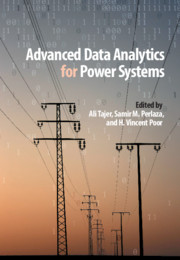Book contents
- Frontmatter
- Contents
- List of Contributors
- Preface
- Part I Statistical Learning
- Part II Data-Driven Anomaly Detection
- Part III Data Quality, Integrity, and Privacy
- Part IV Signal Processing
- Part V Large-Scale Optimization
- 15 Uncertainty-Aware Power Systems Operation
- 16 Distributed Optimization for Power and Energy Systems
- 17 Distributed Load Management
- 18 Analytical Models for Emerging Energy Storage Applications
- Part VI Game Theory
- Index
15 - Uncertainty-Aware Power Systems Operation
from Part V - Large-Scale Optimization
Published online by Cambridge University Press: 22 March 2021
- Frontmatter
- Contents
- List of Contributors
- Preface
- Part I Statistical Learning
- Part II Data-Driven Anomaly Detection
- Part III Data Quality, Integrity, and Privacy
- Part IV Signal Processing
- Part V Large-Scale Optimization
- 15 Uncertainty-Aware Power Systems Operation
- 16 Distributed Optimization for Power and Energy Systems
- 17 Distributed Load Management
- 18 Analytical Models for Emerging Energy Storage Applications
- Part VI Game Theory
- Index
Summary
When uncontrollable resources fluctuate, optimal power flow (OPF), routinely used by the electric power industry to redispatch hourly controllable generation (coal, gas, and hydro plants) over control areas of transmission networks, can result in grid instability and, potentially, cascading outages. This risk arises because OPF dispatch is computed without awareness of major uncertainty, in particular fluctuations in renewable output. As a result, grid operation under OPF with renewable variability can lead to frequent conditions where power line flow ratings are significantly exceeded. Such a condition is considered undesirable in power engineering practice. Possibly, it can lead to a risky outcome that compromises grid stability – line tripping. A chance-constrained (CC) OPF approach is developed, which corrects the problem and mitigates dangerous renewable fluctuations with minimal changes in the current operational procedure. Assuming availability of a reliable wind forecast parameterizing the distribution function of the uncertain generation, this CC-OPF approach satisfies all the constraints with high probability while minimizing the cost of economic redispatch.
- Type
- Chapter
- Information
- Advanced Data Analytics for Power Systems , pp. 363 - 399Publisher: Cambridge University PressPrint publication year: 2021

